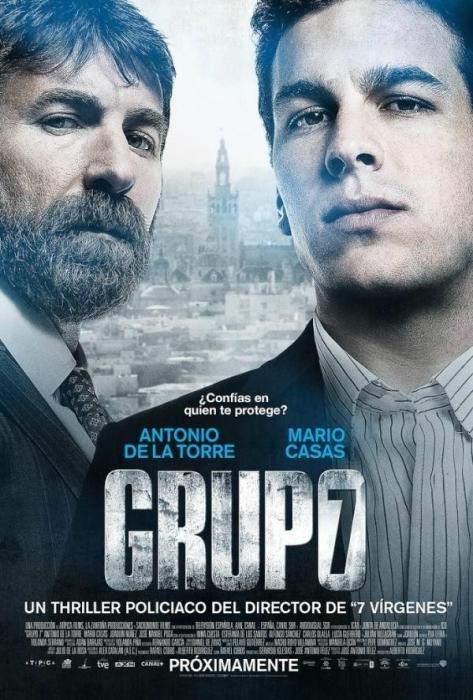In the 1980s, Seville was one of the most violent cities in Spain. With the Olympics in Barcelona drawing international attention to the country, along with the opening of the Universal Exposition of Seville in 1992, Expo ’92, drastic measures had to be taken in order to rid the city of its drug problem.
The government hires an elite group of narcotics officers in order to ‘clean’ the city by whatever means necessary. Unit 7 is formed. The four team members of the unit, Angel (Mario Casas), Rafael (Antonio de la Torre), Mateo (Joaquin Nunez) and Miguel (Jose Manuel Poga) seem like the typical clichéd characters one would find in such a film. However thanks to Rafael Cobos’ clever script and the actor’s heartfelt performances, Unit 7 might just surprise us.
Main protagonist, Angel, is the newest member of the group. Training hard to be promoted for a detective, and earn a good, honest living for his family, whilst suffering from diabetes, Angel instantly gets our sympathy from the start. On the other end of the scale Rafael plays the merciless, violent officer who is ready to bash out with a hammer the information from any criminal he gets his hands on. Then we have Mateo, the womanizer and Miguel, perhaps the only sensible one of the group.
Unlike most action films, which save the major ‘good-guy-catches-bad-guy’ sequence for the end of the film, Unit 7 throws us into the action from the start. A fast paced, throbbing chase sequence takes us around the downtown of the narrow streets of Seville. As we explore the city, following the characters, we notice how the self-destructional nature of its drug abusive community is reflected onto its surroundings, as the scene comes to a close on top of a deserted, old building.
Although the group do a few drug busts every now and then – it’s not enough; their bosses want results, the people want a hero. Suddenly, Angel suggests that they make use of the very thing they try to prevent in order to catch the rest “How many bricks hit the streets? 100? 200? Each one a junkie, each junkie a snitch.”. Now operating on an illegal level, suddenly Unit 7 find themselves on every headline across the country for catching more drug dealers than any other unit in the past. Success is sweet, but it always comes with a price.
It’s not long before people start questioning the methods by which the group gets their information. Doubts about their work starts to take over, while their own lives start to change as a result.
Rafael, who was the most ruthless of all, manages to evoke sympathy as it becomes evident that his anger towards the drug dealers has something to do with the death of his own brother Pablo, although never explicitly mentioned. As he becomes romantically involved with a drug addict Lucia, it is clear that he sees in her his redemption, a second chance to prevent what he couldn’t for his brother. However despite forcing Lucia to stay away from drugs, Rafael realizes that no amount of violence or force will solve hers or any other of the criminal problems which surround them. Making him re-think twice about his own actions against the criminals they catch.
Meanwhile as Rafael changes his ways, Angel on the other hand soaks up the popularity and success of their group, to become a fearless, violent young version of his colleagues. Consequently, his world slowly starts to fall apart. The criminals have now set him as a target, which ends up costing him a lot more than he bargained for.
At the end, more is lost than gained for all four members of the group. They realize that committing themselves to such a job puts in danger everything and everyone close to them. A message perfectly illustrated in the last scene of the film with Rafael and Angel.
Gervasio Iglesias, Alberto Rodrigues and Rafael Cobos form part of the time, where much of these events were still happening during their childhood years. This brutally realistic narrative, shows the real side of the lives of people who spent years battling against the drug crime, and still continue to do so.
With the Olympics and World Cup in Brazil coming up, the film is particularly relevant. Brazil is a country, and Rio a city known for their flavour and beauty, but both also for their violence. The same thing which happened in Spain, is now happening in Rio, on a much bigger scale, one can already see the Brazilian version of this film – in reality and in fiction.















